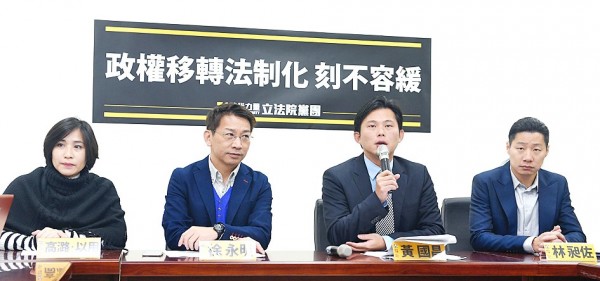《TAIPEI TIMES 焦點》 NPP urges shorter transitions of power

New Power Party (NPP) Executive Chairman Huang Kuo-chang, second right, and three other NPP lawmakers during a press conference in Taipei yesterday stress the urgency of passing legislation regulating the transfer of government power. Photo: George Tsorng, Taipei Times
TRADING PLACES: The party said that the DPP and KMT had switched their stances on transitions of power since 2008, and shortening the transition would limit controversy
By Abraham Gerber / Staff reporter
Early presidential power transitions should be negotiated to shorten the interregnum between administrations, New Power Party (NPP) legislators said yesterday.
At a press conference presenting the party’s version of a proposed presidential transition act, NPP caucus whip Hsu Yung-ming (徐永明) called on the Democratic Progressive Party (DPP) and Chinese Nationalist Party (KMT) to cooperate to shorten the current four-month transition period.
“The proposed ‘transition act’ should not become a tool for parties to attack each other,” he said, adding that the DPP and KMT had switched stances since the last transition of power in 2008.
In 2008, then-president Chen Shui-bian (陳水扁) of the DPP handed over power to incoming president Ma Ying-jeou (馬英九) of the KMT.
DPP president-elect Tsai Ing-wen (蔡英文), elected in the Jan. 16 presidential election, is slated to take office on May 20.
“In 2008, the KMT could not wait to pass [a transition act], but it is fighting against it today — even though the DPP’s proposed bill is not substantially different [from the KMT’s version in 2008],” he said.
He said that the DPP had also flip-flopped, with its current bill allowing the incoming president-elect to veto the implementation of “controversial” policies, despite its previous opposition to a similar KMT-sponsored article in 2008.
The NPP draft bill would invest a president-elect’s transition team with the power to demand funding, manpower, office space and information on major policies and national security issues from the outgoing administration.
NPP Executive Chairman and Legislator Huang Kuo-chang (黃國昌) said the bill’s major difference from the DPP draft is its establishment of a Legislative Yuan committee to arbitrate any disagreements between the presidential-elect and the outgoing administration, also investing the committee with the right to review any new executive orders.
The bill also allows the outgoing president and president-elect to agree to an early power transition, providing it receives approval from a two-thirds majority vote in the Legislative Yuan.
“Only shortening the transition period will get to the root of the legal and political controversy,” Huang said.
While presidential and legislative elections have been held simultaneously over the past two cycles, presidential and legislative terms are currently out of sync by more than three months.
Hsu said that while the Constitution mandates new legislators to take office on Feb. 1, it only mandates that the president have a four-year term of office.
The interregnum period could be cut if parties agree to move the presidential inauguration date, he said.
新聞來源:TAIPEI TIMES













